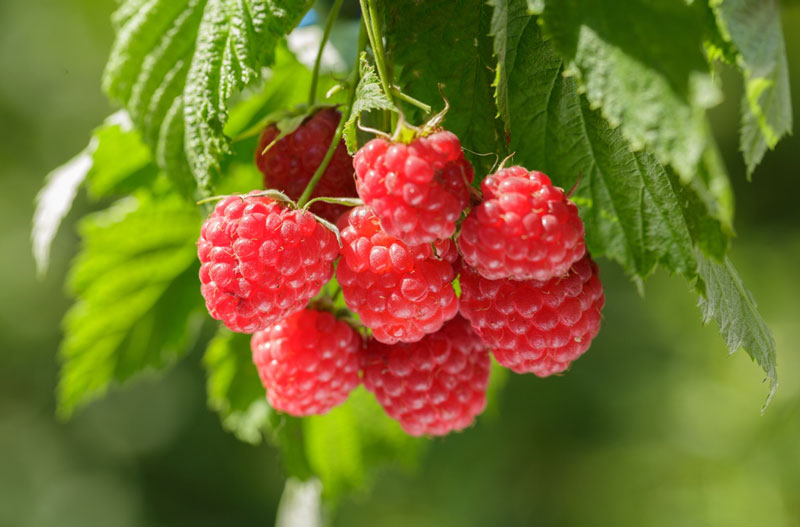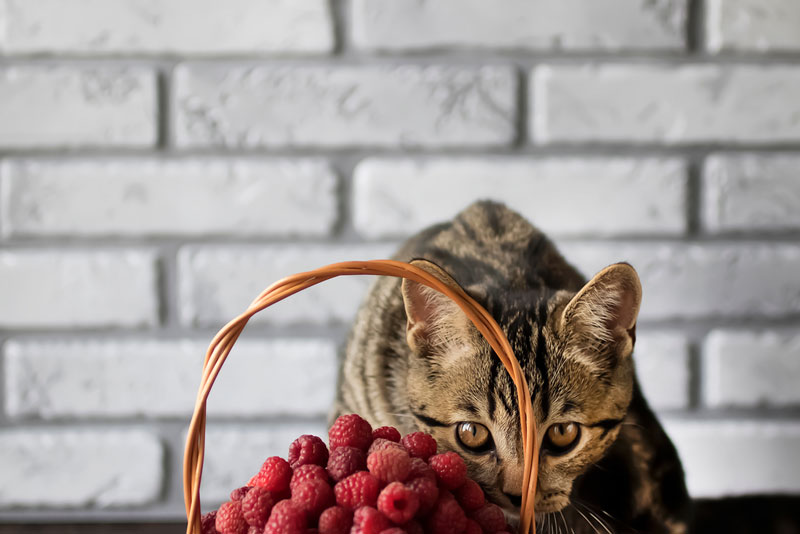Have you ever wondered if our furry little friends can enjoy the sweet taste of raspberries? Can cats eat raspberries, you ask? Well, the short answer is yes, but with certain considerations! Although raspberries are not toxic to cats, there are some things to keep in mind before sharing these delicious berries with your feline companion.
Raspberries are packed with vitamins, minerals, and antioxidants, which make them a great treat for humans. But what about our whiskered pals? While cats are obligate carnivores and primarily thrive on a meat-based diet, they can occasionally snack on fruits like raspberries without harm. However, moderation is key. We want to make sure our cats are happy, healthy, and safe, so it’s important to understand how to incorporate raspberries into their diet correctly.
Keep reading as we explore the ins and outs of cats eating raspberries. We will discuss how much they can have, the benefits, risks, and possible substitutes. Let’s ensure our furry friends get the best from what we share with them!
You might also be interested in: Can Cats Eat Blueberries?
Can Cats Eat Raspberries?

Raspberries can be a fun and tasty treat for our feline friends, but it’s essential to remember that not all fruits are suitable for cats. Cats lack the taste buds for sweetness, so they may not be as interested in raspberries as we are. However, this doesn’t mean they can’t enjoy the nutritional benefits these berries offer in small doses. Raspberries contain fiber, vitamins C and K, and antioxidants. These components contribute to an overall healthy diet for your kitty.
While the flesh of the raspberry is generally safe for cats, there are some parts that we must be cautious about. The seeds can be tough on a cat’s digestive system, and if consumed in large quantities, could lead to digestive upset. Always keep an eye on your cat’s reaction to new foods, and remember that moderation is key! Never introduce too many new treats all at once, and start with a small bite-sized piece of raspberry to see how your cat reacts.
How Much Raspberries Can Cats Eat?
Knowing how much raspberries we can safely offer our cats is an important part of treating them right. Since cats are meat eaters, fruit should never constitute a significant portion of their diet. When it comes to raspberries, think of them as a special occasion snack rather than a daily routine. A small piece—about the size of a grape—once a week can be a nice treat. If you’re unsure, it’s always a good idea to check with your vet. Moderation is key with any treat, and knowing your kitty’s dietary needs will help you gauge the right amount.
Besides size, also think about your cat’s weight and health condition. If your cat is overweight or has any specific health issues, you may want to be extra cautious when it comes to treats, even if they are healthy. Always consult with your vet if you have any concerns about your cat’s diet or health. Remember, our goal is to have happy and healthy furballs running around our homes!
When offering raspberries, ensure they are fresh and washed thoroughly to remove any pesticides or chemicals. You can provide them whole or mash them up a bit for easier consumption; just be sure your cat is comfortable with whatever form you present. If your cat seems to enjoy the raspberries, that’s fantastic! Just keep serving them in tiny amounts and always watch for any signs of upset stomach or allergies.
Benefits Of Raspberries To Cats
1. Rich in Antioxidants: Raspberries are rich in antioxidants. These helpful compounds combat harmful free radicals in your cat’s body. While cats may not need antioxidants as much as humans do, they are still beneficial in supporting overall health.
2. Source of Dietary Fiber: This fruit is a fantastic source of dietary fiber. Fiber can help our kitties with digestion, ensuring their tummies stay happy and regular. A little fiber can go a long way in regulating their digestive system!
3. Vitamins: Raspberries are loaded with vitamins, especially vitamin C and K. Vitamin C supports a healthy immune system, which is crucial for guarding against illnesses. Vitamin K plays a role in blood clotting and bone health, which can be especially essential as our pets age.
4. Help in Hydration: It may also help in hydration! While cats primarily rely on their water intake and wet food, the moisture content in raspberries can aid in keeping them hydrated, especially during those hot summer days when everything seems extra toasty.
5. Great Alternative Snack: Raspberries can serve as a great alternative snack! Instead of reaching for those store-bought treats full of preservatives, why not opt for a natural fruit option now and then? A fresh raspberry can be refreshing and a fun change of pace for your cat’s palate!
Dangers Of Feeding Raspberries To Cats
While we all love to share snacks with our pets, we must also be aware of potential risks. One primary concern is that raspberries contain a small amount of xylitol, a sugar substitute that can be toxic to dogs. Lucky for our kitties, they seem to tolerate it better, but it’s still wise to observe. Too many raspberries can lead to digestive issues such as diarrhea or vomiting.
Also, remember that a sudden introduction of a new snack can sometimes irritate your cat’s sensitive stomach. Start with a small piece to see how your cat reacts. If there are signs of a stomach ache, it’s best to hold off on any fruits for a while and consult a vet if necessary. Always keep the number of treats limited to avoid making any changes to your cat’s overall diet excessive.
Additionally, ensure that any raspberries offered are free from chemicals, pesticides, or artificial sweeteners. The best way to approach any new food for your cat is with caution, as we want nothing but the best for our beloved companions.
Substitute Of Raspberries For Cats
1. Blueberries: If raspberries aren’t appealing, blueberries are another fruit that cats can enjoy! Rich in vitamins and safe in small amounts, blueberries can be a great alternative snack while providing similar benefits.
2. Watermelon: This is a fun and hydrating option for your cat, too. Just remember to remove the seeds and rind first, as they could lead to digestion problems.
3. Cantaloupe: This is another sweet treat cats often enjoy. Interestingly, many felines are attracted to the smell of melons. Again, be sure to cut it small and watch your cat enjoy the tasty treat!
4. Carrots: For a crunchier snack, consider offering carrots. Just make sure to chop them into tiny pieces and cook them a bit to make them easier to chew. Carrots are nutritious and have a slightly sweet taste that some cats appreciate.
5. Pumpkin: Last but not least, consider adding a small bit of pumpkin puree to your kitty’s snacks. Pumpkin is safe and beneficial for cats—they often love the creamy texture!
Can Cats Eat Raspberries? Frequently Asked Questions
Are Raspberries Safe For All Cats?
Most cats can safely consume raspberries in moderation. But always keep an eye on individual reactions and check with your vet if you’re unsure.
Can Cats Be Allergic To Raspberries?
While feline allergies are rare, they can occur. Start slow and monitor for any signs of allergies after feeding raspberries.
What Other Fruits Can Cats Eat?
Fruits like bananas, apples, and strawberries can be given in moderation. Always remove seeds and skins when necessary!
How Should I Prepare Raspberries For My Cat?
Always wash the raspberries thoroughly, and consider cutting them up into small, manageable pieces for easy snacking.
What Should I Do If My Cat Has An Upset Stomach After Eating Raspberries?
If your cat shows signs of an upset stomach, such as vomiting or diarrhea, contact your vet for guidance and keep track of what they eat.
Final Thoughts
Can cats eat raspberries? They can! But as with any treat, moderation is crucial. Offering the occasional raspberry can provide a fun and healthy snack for our fur babies. Always start with small bites, and watch for how they react to this fruity delight.
Keep your pet’s health and happiness in mind as you introduce new foods. And don’t forget to explore more about cat-friendly treats, such as other fun topics we love to share with you! Every little detail helps in making informed choices for our lovable companions.


